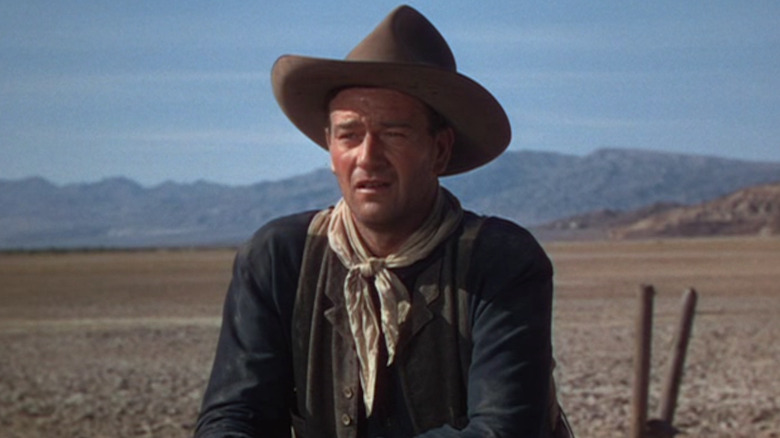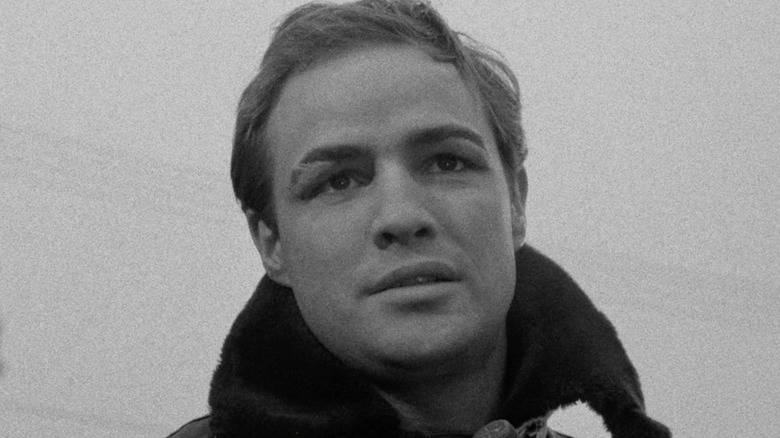How John Wayne Felt About Marlon Brando's Method Acting
We may receive a commission on purchases made from links.
John Wayne was not, to put it mildly, a precious actor. According to Scott Eyre's biography "John Wayne: The Life and Legend," Howard Hawks once said, "Wayne never read a script that I had. He'd say, 'What am I supposed to do in this?'... He'd never learn lines before I talked to him, because he said that threw him off. He could memorize two pages of dialogue in three or four minutes, and then he just goes and does it."
So, it shouldn't come as a surprise that the introspective process of method acting exemplified by new breed stars like Marlon Brando, Montgomery Clift, and Julie Harris irritated a straightforward star like Wayne. Aside from the skills he'd cultivated through study and repetition (horse riding, gun spinning, and screen combat), he wasn't big on interiority. With very few exceptions, he took on roles that showcased his rugged, capable, and laconically quippy persona. It had taken Wayne a decade to land the part that made him a full-blown movie star (The Ringo Kid in John Ford's "Stagecoach"), and he was eager to give 'em more of what they loved about him (typically with top talents like Hawks, Ford, and Cecil B. DeMille behind the camera).
When the Method turned into a performance phenomenon, reporters and talk show hosts were desperate to hear what the old guard thought about this newfangled approach to acting. Wayne was not shy about sharing his thoughts on the process, and when it came to the Method king, Marlon Brando, he had some pretty strong feelings.
The Duke respected Brando, but loathed Method acting
During a visit to "The Merv Griffin Show" in 1966, Wayne was asked about how Method innovator Lee Strasberg had assessed the Duke's (and Gary Cooper's) work as "perfectly natural," i.e. that they "try not to act, but be themselves." Wayne seemed appreciative of the sentiment, but this didn't automatically make him a fan of the Method.
"[T]he thing is, they're all copying that poor guy that played in 'Mutiny on the Bounty,'" said Wayne, strangely refusing to call Brando by name. Still, he was a fan. "They all copy him. This guy is great, but they all copy him so he looks like a Method player." Wayne added, "Nobody copied Coop, and certainly nobody's been stupid enough to copy me."
Wayne's distaste for the Method might've stemmed from his contentious experience co-starring in Hawks' "Red River" with Method prodigy Montgomery Clift. After a disastrous bear-hunting trip with Wayne and Hawks' son David (during which they got lost and had to put down a horse), Clift wrote in a letter to a friend, "You see what happens when you turn a bunch of fascists loose in the hills?" Wayne, meanwhile, had no patience for Clift's clumsiness with guns. "Christ, my goddamn kid can do it, for Christ's sake and he's 11 years old," yelled the Duke. "You can't do it? Do it!"
Realizing that Clift was having difficulty becoming a believable cowboy, stuntman Danny Sands said Hawks took the actor aside and told him to study stuntman (and future Academy Award nominee) Richard Farnsworth's every movement. "'Montgomery, you walk along behind him and watch him carefully. If he scratches his butt, you scratch yours. He's a real cowboy,'" as Hawks recalled telling him. "And he did, by God. Farnsworth took him and tutored him and, damn, he made a cowboy out of a hell out of an actor."
Wayne never warmed to Clift, though, and continued to dislike his work as an actor. That said, Harry Carey Jr. said that Wayne eventually softened (just a little) on his former co-star, recalling, "Years later, I said I thought Monty was very effective in 'Red River,' and Duke said, 'He was a pain in the ass.' But he didn't deny he was effective."
As for Brando, it's probably for the best that the eccentric star of "A Streetcar Named Desire," "On the Waterfront," and "The Godfather" never worked with the no-nonsense Wayne — though they did both share a disdain for memorizing their lines ahead of time!

